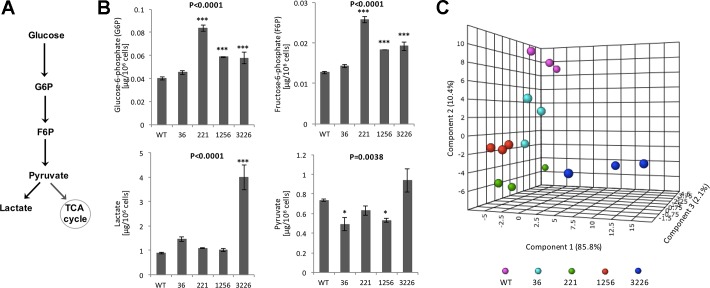Fig. 8.
Truncating mutations in the polycystic kidney and hepatic disease 1 (PKHD1) gene increase glycolysis. A: metabolic pathway of glycolysis converts glucose to pyruvate via a series of intermediate metabolites. Its initial components are glucose 6-phosphate (G6P) and fructose 6-phosphate (F6P); pyruvate and lactate are the end products of glycolysis. TCA, tricarboxylic acid cycle. B: liquid chromatography-multiple reaction ion-monitoring mass spectrometry was used to determine key metabolites of the glycolytic pathway. Compared with a pool of wild-type (WT) human embryonic kidney (HEK-293) clones, PKHD1 gene mutations increased levels of G6P [F(4,10) = 38.96, P < 0.0001], F6P [F(4,10) = 66.72, P < 0.0001], and lactate [F(4,10) = 32.16, P < 0.0001]; overall, pyruvate levels were decreased [F(4,10) = 7.92, P = 0.0038]. C: principal component loading plot of components 1, 2, and 3 extracted from factor analysis of the individual glycolytic components. The cluster representing biological replicates of pooled wild-type (WT) HEK-293 clones is distinctly separated from clusters of HEK-293 cells with PKHD1 truncating mutations.

